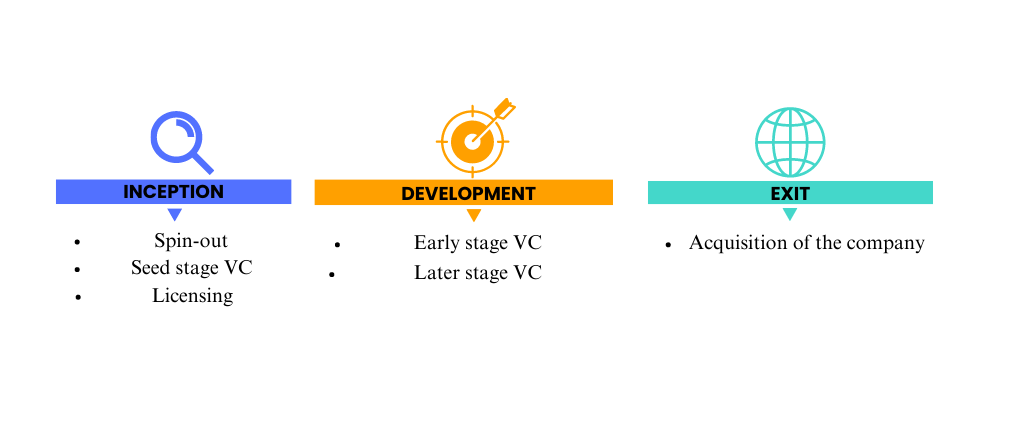Biotech startups and the pharmaceutical industry - or how to start a collaboration between a small company and a large industry partner?
Getting a startup to work with a corporate partner is not easy, but if successful, it can contribute significantly to the company's growth. What aspects are worth paying attention to in order to increase the likelihood of creating such cooperation and success in partnering with a corporation? We will try to answer this and many other questions in this article.
The key is to successful cooperation with a big company - whether it's biotech or other industry, is to deliver a proposal that brings real value to a potential business partner. It is also important to prepare for such discussions well and find the right person in complex corporate structures who may find our proposed solution useful.
Types of partnerships that show collaboration with an industrial partner:
- Early "case study" projects - Technology Validation
- Pilot projects
- Implementation projects
- Strategic partnerships
Collaboration between startups and corporations is crucial for the development of business innovation in Europe. Companies that create strategies for long-term growth realize that the best innovation ideas do not always come from within their organizations. According to research conducted by Huge Thing, as many as 75% of Fortune 500 companies are active in the CVC (Corporate Venture Capital) sector, and 40% have their own CVC units.
Partnership between a biotech start-up and a pharmaceutical company allows both parties to significantly accelerate the research and development process. This model also became increasingly popular in Poland. Biotech start-ups often excel in early-stage preclinical development; the ability to specialize and conduct research on a specific therapy makes them a good partner for cooperation with a pharmaceutical company. There are many reasons why such collaboration is interesting for an industrial partner.
Entering into a partnership with a pharmaceutical company can begin at various stages of a startup's development. The company can be a parent organization for the spin-out, a seed investor, or an asset licensor for the startup - giving it access to specialized infrastructure, for example. More mature start-ups can also receive investment support at various stages of development. In the final stage of cooperation, a pharmaceutical company may offer to acquire the startup.

The 2021 article, "How large pharma impacts biotech startup success" published in Nature Biotechnology, presented the results, which showed that a startup's success rate, as determined by drug product approval from a registration agency and the likelihood of an acquisition, increases from 18% to 37% when an investor from a large pharma company is "on board." This combination also increased both the valuations of startups partnering with a large company (from a median of $138 million to $332 million in market capitalization) and the value of acquisition (from $136 million to $377 million).
A strategic partnership between a biotech start-up and a major market player enables, first of all, the industrial validation of its solution, and the development of a case study that confirms the real value of the solution. This type of partnership significantly accelerates the development of a given product, through expertise from the pharmaceutical company, and specialized infrastructure, as well as a significant reduction in the level of risk when conducting capital-intensive R&D for new drug development. This cooperation also allows for faster commercialization and potentially reaching multiple distribution channels.
Partnerships are inherently beneficial to both parties, so the pharmaceutical company also stands to gain a lot from the collaboration. Among the most important benefits is access to external innovation. The main characteristic of the startup world is its flexibility and dynamic action, that is possible due to the size of such a company. It is common for startups to take more technological risks and test multiple product variants before betting on the one potentially most interesting to the market. It is a feature that distinguishes startups from large companies. The creation of innovation inside a corporation is not always easy due to the high complexity of procedures, the strategic directions of the company's development, and the focus on short-term and long-term business goals. Therefore, cooperation with startups can give a large company quick access to new products and services with minimal involvement of own R&D resources and can lead to increased openness to innovation in a rapidly changing business environment. Thanks to such cooperation, the pharmaceutical company can also accurately track changes in the market which supports the maintenance of its market position.

Cases from the Polish market
Poland has seen significant development in the biotechnology industry over the past decade. As a result, more and more startups working in this area are appearing on our market. Teams often work on developing new therapies or innovative biological drugs. This type of product in a startup's portfolio allows for interest from a large pharmaceutical company. Below we present some examples of successful collaborations from our market.
Ryvu Therapeutics and BioNTech have launched a global collaboration to develop new small-molecule compounds that modulate immune system activity in cancer, and also potentially other disease areas. Ryvu Therapeutics is a Polish biotechnology company active in drug discovery and development, mainly in oncology.
Biotts and Servier have begun joint research. They will work on technology that will improve the lives of millions of patients. Details of the collaboration remain a secret for now. Biotts scientists are focusing on the development of proprietary drug transport and drug formulation technologies in the areas of diabetology and oncology.
Selvita and Berlin-Chemie Menarini have entered into a global licensing agreement for the SEL24 project focused on the development of a dual PIM and FLT3 kinase inhibitor for the treatment of refractory acute myeloid leukemia (AML). Selvita is one of Europe's largest biotechnology companies active in drug discovery and development in the oncology field.
As you can see above, there are many benefits of a startup collaborating with a pharmaceutical company. So, what are the tips for creating such cooperation?
1. When you only have a business idea, check the market and business environment. Verify the competition.
At the beginning of our startup journey is important to check the market and business environment. First, examine the competition, i.e., existing companies offering similar solutions that may be competitive with your proposal. It is also worth analyzing their strategies, the features of their products, and previous partnerships with an industry partner. Competitive analysis will allow you to learn about the strengths and weaknesses of your rivals and plan a strategy to obtain the partnership of a pharmaceutical company. In this way, we can develop a competitive advantage that can bring you closer to such a partnership.
2. Identify potential partners. Who might be interested in your solution? And check whether the partner you have selected needs it.
First of all, it’s important to know everything about the market you want to operate in. It's a good idea to do an overview of the market and business environment of your startup and then identify large pharmaceutical companies which may strategically match the technology you are creating or the therapeutic area your startup is working on. Look for companies that have worked with startups or invested in early-stage solutions. You can use industry reports and databases. It's also a good idea to personally browse news websites to know what therapeutic areas the company is focusing on.
„Once we have a good idea of the business environment in which we are moving and have already selected partners who we think might be interested in our solution, we need to find the right person in a given company who is in charge of implementing new programs, innovation, cooperation with external suppliers, or specifically responsible for the area of operation to which our product relates. The worst thing we can do is to send so-called "cold e-mails" to random people (many) in a given organization. If we reach such a person and arrange a first meeting, the key is to prepare very well for such a meeting. Start-up representatives need to know precisely why they are coming to a large company, what questions they have, and how their solution fits into the operations of the company they want to work with. Large companies have many specialists in particular fields, so the presentation should suit the audience and contain factual information which shows the potential of the presented solutions. Advertising slogans alone are not enough, more important are case studies that show your value proposition” says Karolina Tkaczuk, senior director of Innovation and Academic Alliance at Astra Zeneca
3. Remember to protect intellectual property
Protecting intellectual property rights is extremely important for companies that want to create value and achieve investment success or go public. The best approach is to remember intellectual property protection from the beginning of your business. This approach allows you to meet all the main milestones and learn to talk freely about your solution. Also, all contracts should be carefully analyzed. If in any doubt, consult a lawyer. The right patent strategy will provide a strong foundation for future growth, revenue generation, and investment. The patents protect new technology and block rivals from entering the market. Moreover, this action may lead to increasing profits and market share.
4. Learn to talk about your project in a concise way. Prepare a good pitch deck.
Remember that not every pitch deck is suited for every audience. Each company should tailor its presentation to who it is talking to, i.e., a pitch deck for an investor is not what you should show to a potential customer. Develop a clear message that explains the technology or product your start-up is developing, an unmet market need that your potential client may also potentially have. Demonstrate how your product addresses this need and the value it can bring to the company. Highlight any unique points of your solution, such as a new mechanism of operation, and show examples of how such solutions are used.
5. Build relationships and meet people working in your industry. Attend industry events and meetings.
It's also worth remembering that you can meet our potential partners at conferences and industry meetings, which usually revolve around business development or research and development. These provide an ideal place to present your ideas to a potential business partner. Such situations may result in a large pharmaceutical company approaching a smaller company rather than the other way around, giving it an advantage in negotiating a deal. Use these interactions to build relationships with decision-makers and learn about their priorities and areas of interest.
6. Prepare to negotiate a cooperation agreement
Once you get interest from a potential partner for your solution and find an area for cooperation, the next stage is negotiating the terms of the cooperation. You must approach this stage with an open mind and understanding of how your client's business works. You should have well-defined expectations and a description of our offer, but also well-defined areas where you can show some flexibility. The best type of partnerships happen when both parties get the benefits that are important to them in particular time. When entering into a partnership with a large pharmaceutical company, be prepared for the long period of contract processing. Some collaborations include licensing agreements, co-development partnerships, and capital investments. The negotiation process can be very different depending on the type of cooperation.

7. Sign the contract and start collaboration
To establish the terms of cooperation, you will need a clear, carefully prepared work schedule, also known as milestones, a timetable, and scope of the project. To make sure that the cooperation will go according to plan it is necessary to establish the frequency of regular meetings, follow-up visits, and the methods of reporting on the progress of work.
In conclusion, establishing cooperation with medium and large pharmaceutical companies requires careful planning, preparation, and relationship building. These actions increase the chances for this cooperation and significantly affect the success of your project. Therefore, it is worth putting careful effort into preparing for an industry partner search, bearing in mind that you may have only one chance to present your product or service, and lack of preparation may close the door to potential partners.







